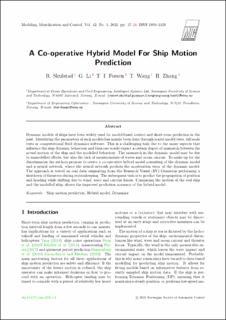A Co-operative Hybrid Model For Ship Motion Prediction
Peer reviewed, Journal article
Published version

Åpne
Permanent lenke
https://hdl.handle.net/11250/2758523Utgivelsesdato
2021Metadata
Vis full innførselSamlinger
Sammendrag
Dynamic models of ships have been widely used for model-based control and short-term prediction in the past. Identifying the parameters of such models has mainly been done through scaled model tests, full scale tests or computational fluid dynamics software. This is a challenging task due to the many aspects that influence the ship dynamic behaviour and thus one would expect a certain degree of mismatch between the actual motion of the ship and the modelled behaviour. The mismatch in the dynamic model may be due to unmodelled effects, but also the lack of measurements of waves and ocean current. To make up for the discrepancies the authors propose to create a co-operative hybrid model consisting of the dynamic model and a neural network, where the neural network predicts the acceleration error of the dynamic model. The approach is tested on real data originating from the Research Vessel (RV) Gunnerus performing a shutdown of thrusters during station keeping. The subsequent task is to predict the propagation of position and heading while drifting due to wind, wave and current forces. Comparing the motion of the real ship and the modelled ship, shows the improved prediction accuracy of the hybrid model.
